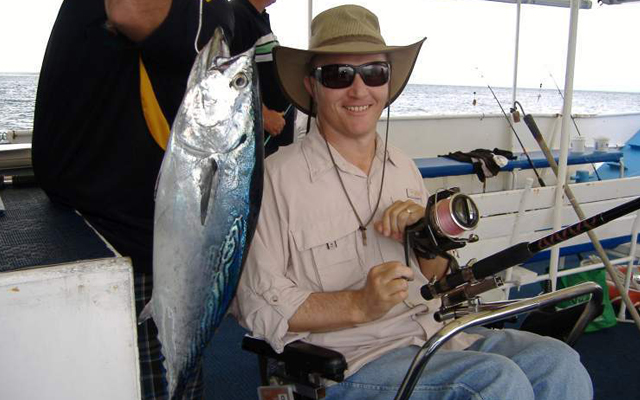A wheelchair-designed charter cruise, a fishing operator with a purpose-built motorised rod, and a business that has developed a power chair with the ability to transform into a fishing chair, are three fishing businesses in Queensland paving the way for everyone to experience the joy of landing their first catch.
Based on the Gold Coast, Pacific Wind is Australia’s first wheelchair-designed charter cruise boat. It was launched when Michael Brown, the brainchild behind the venture who is a quadriplegic and wheelchair-bound angler, purchased the boat and fitted the boat for wheelchair access in 2017.

Further up north, Robert Agius, owner of Reel Keen Powerchair in Hervey Bay, has created a worldwide product to assist fishing fanatics to hold a rod and be able to reel in the big fish, all while on a wheelchair. He is in the process of purchasing a purpose-built fishing vessel to take clients to his favourite local fishing spots.
Meanwhile, Fishability – a partnership between Bribie Island Boat Charters and several community groups – helps individuals requiring support to experience the joy of fishing with the assistance from trained and experienced volunteer guides, and by using purpose-built motorised rods, reels and fishing rod holders.
Tourism businesses such as these will be further supported this year as the Queensland government declared 2023 as The Year of Accessible Tourism in Queensland, where A$12 million (US$7.9 million) in funding has been set aside to create opportunities for small- to medium-sized tourism and events businesses to develop or enhance accessibility for people of all abilities.
With this move, the government aims to change the perception of what it means to be an accessible tourism business, and will promote accessible tourism destinations and experiences in Queensland.
According to a 2017 Tourism Australia study, travellers with a disability spend A$3.3 billion on tourism, accounting for 17 per cent of all tourism expenditure. Equally, they account for 21 per cent of day trips and spend five per cent more than people without disabilities.
“The statistics prove that this really is an untapped market. Great Fishing Adventures of Australia (GFAoA) supports and promotes all types of fishing in Australia as we believe our operators and our locations are the best in the world. This includes inspiring all people to fish in Australia, regardless of disability,” said Ange Esdaile, executive officer of GFAoA, a collective of independent fishing operators.
She added: “We encourage our operators in the GFAoA collective to realise the potential of this market and work towards inclusivity in both infrastructure and experience.”
As to how tourism businesses in Australia can be more inclusive, Esdaile opined that it would help if they could “say yes where possible”.
Moving forward, Esdaile pointed out that continuous education would be key, and programmes, such as the Queensland Tourism Industry Council self-assessment module to help tourism businesses evaluate their facilities and procedure, would be of great help.




















